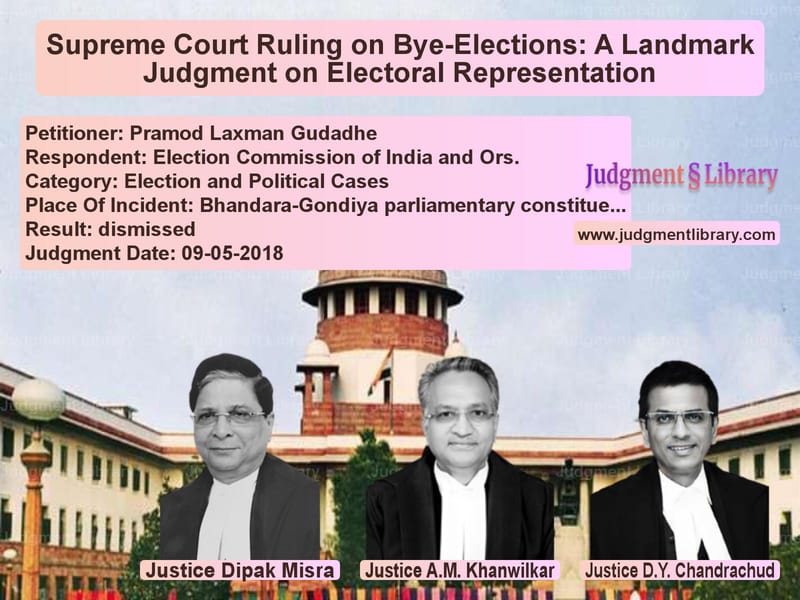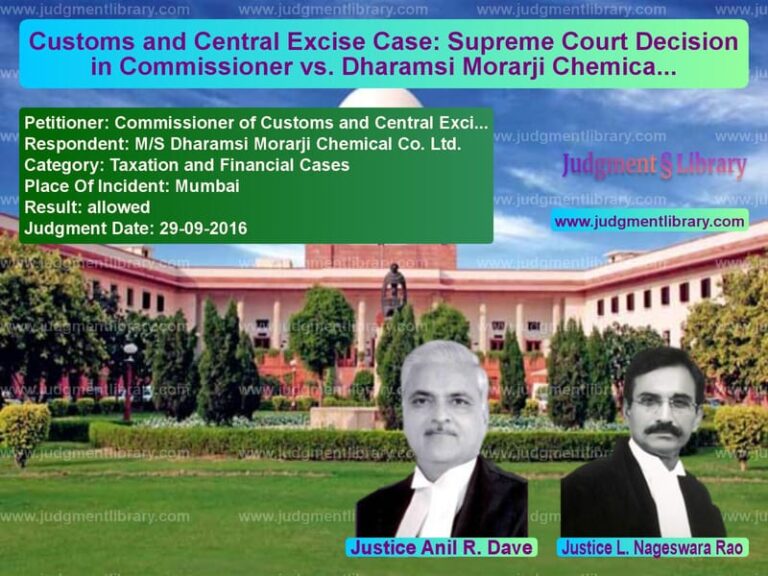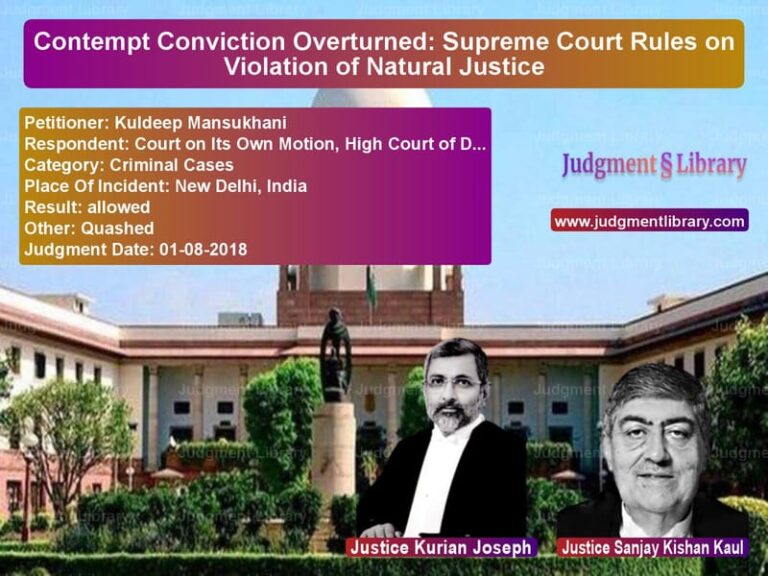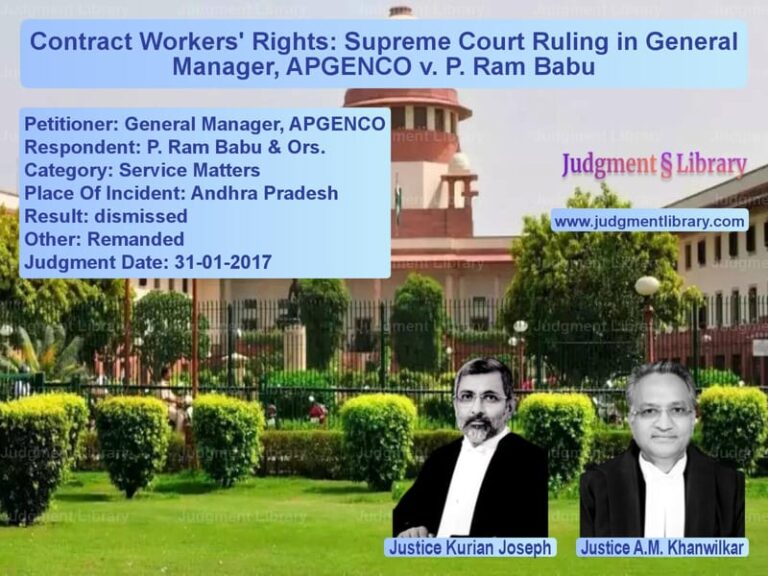Supreme Court Ruling on Bye-Elections: A Landmark Judgment on Electoral Representation
In a democratic setup, the right to vote and elect a representative is one of the most significant rights conferred upon citizens. The case of Pramod Laxman Gudadhe vs. Election Commission of India and Ors. raised crucial questions about the conduct of bye-elections, their necessity, and their impact on democratic representation.
The petitioner, Pramod Laxman Gudadhe, filed a public interest litigation challenging the decision of the Election Commission of India to conduct a bye-election in the Bhandara-Gondiya parliamentary constituency following the resignation of the sitting Member of Parliament (MP). He argued that conducting an election for a short duration before the next general election would be futile and an unnecessary financial burden.
Background of the Case
The case revolves around a parliamentary seat that fell vacant when the elected representative from the Bhandara-Gondiya constituency resigned on December 8, 2017, and the resignation was accepted on December 14, 2017. As per the Representation of the People Act, 1951, a bye-election is required to be held within six months of a vacancy unless the remainder of the term is less than one year.
The petitioner approached the Bombay High Court (Nagpur Bench), arguing that the election should not be held because the remaining tenure was short, and conducting an election would be a waste of resources. The High Court dismissed the petition, prompting the petitioner to file a special leave petition before the Supreme Court.
Arguments by the Petitioner
The petitioner presented several arguments before the Supreme Court:
- Election for a Short Tenure: The petitioner argued that if the bye-election was conducted in May 2018, the elected representative would serve only until March 2019, making it impractical for the new MP to function effectively.
- Financial Burden: Conducting an election requires significant resources, including manpower, logistics, and security arrangements. The petitioner contended that spending taxpayer money on a short-term election was unwarranted.
- Applicability of Section 151A: The petitioner relied on Section 151A of the Representation of the People Act, which provides that a bye-election should not be conducted if the remaining term is less than one year. He interpreted the provision as a mandate to avoid elections in such cases.
Arguments by the Respondent
The Election Commission of India, representing the respondent, countered these arguments as follows:
- Legal Obligation to Hold Elections: The Election Commission argued that the statutory framework mandates elections within six months of a vacancy unless the remaining term is less than one year. Since the term extended beyond one year, elections were necessary.
- Democratic Representation: A parliamentary seat should not remain vacant for an extended period, as this would deprive the citizens of their right to representation.
- Judicial Precedents: The respondents cited previous cases that upheld the necessity of elections for democratic continuity and asserted that financial constraints cannot be a ground to avoid elections.
Key Judicial Observations
Chief Justice Dipak Misra, delivering the judgment, emphasized the importance of electoral participation, stating:
“When an individual, bereft of his status, goes to an election booth to cast his vote, he feels empowered and dignified, and his self-esteem is accentuated. The participation makes him realize his political right and the collective feels that governance will be in accordance with constitutional principles.”
The Court analyzed Section 151A of the Representation of the People Act, 1951, which states that a bye-election must be conducted within six months unless:
- The remainder of the term is less than one year, or
- The Election Commission certifies that conducting the election is difficult.
The Court noted that since the vacancy arose in December 2017 and the general elections were scheduled for June 2019, the remaining term exceeded one year. Thus, the Election Commission was obligated to conduct the bye-election.
Supreme Court’s Rationale
The Supreme Court provided a detailed interpretation of Section 151A, making the following key observations:
- Democracy Demands Representation: The fundamental principle of democracy requires that every constituency should be represented in Parliament. The absence of an elected representative would deprive the citizens of their voice.
- Financial Considerations Are Secondary: The Court dismissed the argument that financial burden should be a reason to avoid elections, stating that the cost of democracy cannot override the necessity of representation.
- Strict Interpretation of Election Laws: The right to contest elections is statutory, and such laws must be interpreted strictly to ensure fair representation.
Relevant Case Laws
The Court referred to several previous judgments to support its ruling:
- Election Commission of India v. Telangana Rastra Samithi (2011): The Supreme Court held that vacancies in legislative bodies must be filled promptly unless specific legal exceptions apply.
- D. Sanjeevayya v. The Election Tribunal, Andhra Pradesh (1967): The Court emphasized that election laws should be interpreted in a manner that upholds democratic principles.
- Thomas Mates Gudinho v. Election Commission of India (2002): The Karnataka High Court ruled that Section 151A must be read in conjunction with other election provisions to ensure representation.
Final Judgment
The Supreme Court dismissed the special leave petition, stating that the High Court had correctly interpreted the law. The Court ruled:
- The Election Commission was duty-bound to conduct the bye-election.
- Financial considerations could not override constitutional mandates.
- The absence of any pending election petitions further justified the necessity of holding the election.
The judgment reaffirmed the sanctity of democratic representation and upheld the Election Commission’s authority to conduct elections as per statutory requirements.
Petitioner Name: Pramod Laxman Gudadhe.Respondent Name: Election Commission of India and Ors..Judgment By: Justice Dipak Misra, Justice A.M. Khanwilkar, Justice D.Y. Chandrachud.Place Of Incident: Bhandara-Gondiya parliamentary constituency.Judgment Date: 09-05-2018.
Don’t miss out on the full details! Download the complete judgment in PDF format below and gain valuable insights instantly!
Download Judgment: Pramod Laxman Gudadh vs Election Commission Supreme Court of India Judgment Dated 09-05-2018.pdf
Direct Downlaod Judgment: Direct downlaod this Judgment
See all petitions in Public Interest Litigation
See all petitions in Legislative Powers
See all petitions in Fundamental Rights
See all petitions in Judgment by Dipak Misra
See all petitions in Judgment by A M Khanwilkar
See all petitions in Judgment by Dhananjaya Y Chandrachud
See all petitions in dismissed
See all petitions in supreme court of India judgments May 2018
See all petitions in 2018 judgments
See all posts in Election and Political Cases Category
See all allowed petitions in Election and Political Cases Category
See all Dismissed petitions in Election and Political Cases Category
See all partially allowed petitions in Election and Political Cases Category







